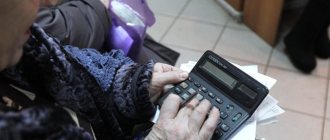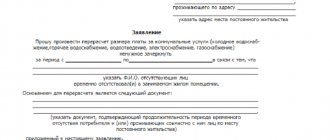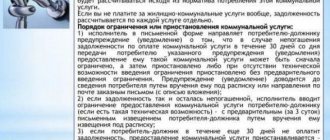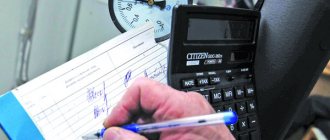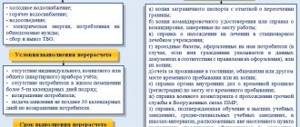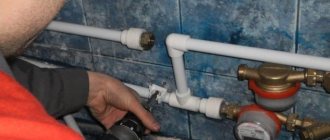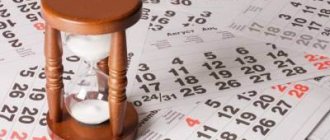Paying for water and electricity using meters is much more profitable than paying for average standards without installed meters.
But even if there are meters in the apartment, their data is not always transmitted to the management company on time. How is the amount payable calculated in this case? Based on average data for previous months or according to established standards? If I submit new data on meter readings, will previously accrued amounts be recalculated? Will there be penalties or fines if you do not submit meter data? Let's try to understand these questions in this article.
As practice shows, if for some reason you do not transfer metering data to the management company, then, first of all, the amounts to be accrued will be calculated based on the average statistical data for the last months, and then based on standard indicators.
What is recalculation for water in a housing and communal services receipt?
Depending on what amenities the living space is provided with, the consumer has to pay for cold and hot water, electricity, gas or solid fuel, water disposal (wastewater), waste collection and removal (MSW). According to parts 4-5 of Art. 154 of the Housing Code of the Russian Federation, the fee for a “communal apartment” includes water (cold and hot), energy, and sanitation spent on maintaining the common property of an apartment building.
The total payment billed by the management company to the consumer-tenant (or owner) is calculated from the readings of individual meters (apartment) and common building meters. If there are no meters, payment is calculated according to utility consumption standards. This procedure is also established for payments for water (Rules, approved by Decree of the Government of the Russian Federation No. 354 of 2011).
In some cases, a receipt for payment of utilities contains a recalculation column that adjusts the total payment amount up or down. The amount is adjusted upward by resource supply organizations based on the results of meter checks, but to reduce the amounts for one reason or another, residents will have to write an application for recalculation.
The difference between the accrued and previously paid amount for water and the amount that actually needs to be paid is the amount of recalculation for water.
Why do you need a water meter?
Water bills can be calculated in several ways:
- according to standards - standards are calculated by the state based on average water consumption, and regions charge a premium. The standard is calculated for each person registered in the apartment. It immediately becomes clear that this option is much more expensive, because not all registered residents always live in the apartment, and it is quite difficult to use such a volume of water. This option entails an overpayment of 2 and sometimes 3 times;
- according to the meter readings - the meter calculates the amount of water that you consume and for which you will pay. This option is more profitable for the consumer, as it does not entail overpayments.
Grounds for recalculation
Current legislation provides for the possibility of recalculating amounts for water and other utility resources.
If there are meters in the apartment, this is done for one of the following reasons:
- Based on the results of checking the metering devices in the apartment. If the readings provided by the homeowner to calculate payments do not correspond to those found during the inspection by representatives of the resource provider, a recalculation is made based on the inspection data. In this case, it is possible that the amount will either decrease (if the readings were submitted with an overestimation of volumes) or increase it (if the readings were underestimated).
- In case of violation of the rules for connecting the consumer to networks. In this case, recalculation for the service is made on the basis of an act of the commission that established the fact of an incorrect connection. In this case, the consumer is charged additional fees for the unaccounted resource (for water, this is done based on the throughput of the pipes) and is given an order to eliminate such a connection. If it is impossible to establish since when the incorrect connection has existed, additional fees will be charged for the three previous months (according to Article 354 of the Resolution, paragraph 62).
- In case of interference with the operation of meters. Frequent reasons for recalculation on this basis are the loss of seals, missed deadlines after calibration of meters, etc. Recalculation is done from the date of installation of seals and devices that allow recording unauthorized interference in the operation of meters, but no more than three months prior to that. in which interference with the operation of devices has been established.
- When providing services (including cold water, hot water) with interruptions exceeding the standard duration, or of inadequate quality (for example, low temperature hot water). At the same time, the person guilty of providing low-quality services or their absence is obliged to pay the consumer a fine (Part 4 of Article 157 of the RF Housing Code, Section 9 of Rules No. 354).
As follows from the above, the initiator of the recalculation can be both the consumer himself and representatives of utility services authorized to conduct inspections of the consumption of relevant resources.
General information
It is necessary to transfer data from water and electricity meters on a monthly basis, otherwise you can see a rather impressive amount of payment on your receipts. If you regularly transmitted meter readings and for some reason stopped doing so, then you can expect a significant change in the data in the receipts no earlier than six months later.
Until this time, the calculation will be based on the indicators of previous months and years. If the transfer of information is delayed for more than 3 months, a multiplying factor of 1.5 will be used to calculate the amount payable. This is not a fine yet, but you will have to pay a little more. After six months of not providing information, the basis for calculating fees for housing and communal services will be based on standard consumption tariffs, which may differ in different regions.
The price of the tariff depends on the costs of water production, carrying out the water preparation process, delivery to consumers, maintaining pumping stations and water supply in working condition. The use of a meter does not in any way affect the reduction of the tariff, but allows significant savings due to the fact that in fact much less resources are used than are established by regulations.
The procedure for recalculating utilities
Adjustments to amounts accrued for utilities can be made:
- Based on a protocol or report of inspection/checking of metering devices;
- According to the consumer.
If the initiative is taken by a citizen-consumer of utilities, he must submit an application to the company providing the relevant services (heat supply or water utility). The application must be registered (make a note of acceptance on a copy of the application). If there are additional documents (inspection reports, quality reports, etc.), they are also attached to the application.
The application must be reviewed within no more than 5 working days. If the decision is positive, utility bills will be revised, and overpaid amounts will be offset against future payments (that is, in subsequent periods the consumer has the right to pay smaller amounts).
In case of refusal to recalculate, the citizen is left to decide what to do next: he has the right to apply at his own choice to Rospotrebnadzor (for the quality of services), the prosecutor's office or the court.
What happens if meter readings are reported incorrectly?
In this case everything is simple. It is necessary to report the error to the management company or resource company and provide the actual meter readings. If you overpaid, it will be counted against payments for subsequent months and most likely the company will send a controller to you to verify the readings.
If you mistakenly submitted readings that are less than they actually are, then there is no need to report them anywhere. Just give accurate readings next month and automatically pay the difference that you underpaid for the last month. There are no penalties for reporting false information if it is done unintentionally.
How to recalculate water using a meter
The most common situation that requires recalculation of accrued amounts for cold water or hot water supply is incorrectly transmitted readings to the resource supply organization, which resulted in an overpayment for water.
The procedure to be followed is as follows:
- Record accurate instrument readings with the participation of suppliers. To do this, you need to call specialists from the heat and water supply organization and draw up a report.
- Attach a document for inspection of metering devices to the application and submit it to the billing department of the service provider.
- Expect recalculation, which will be reflected in the next payment receipt.
Recalculation for water according to the meter is done by the service provider in accordance with clause 61 of the Rules, approved. Resolution 354. At the same time, new meter readings taken on commission, at the request of the consumer, are accepted for recalculation only if it is established that the meters themselves are in good working order, the verification period has not expired, and the integrity of the seals has not been broken.
Data transfer deadlines
The rights and obligations of utility organizations and consumers are approved by Government Decree No. 354, adopted in May 2011 and establishing the basic rules for the provision of these services to the population.
Document for downloading and reading the resolution: Decree of the Government of the Russian Federation No. 354
According to the specified document, the transfer of information for the current month must be carried out no later than the 26th day, and not after the end of the reporting period.
We recommend: Features of using a check valve for a water meter
Hot water does not meet the standard - how to recalculate
Payment for hot water supply constitutes a significant part of all utilities, and its quality is not always satisfactory. If rusty or lukewarm water comes out of the tap, if there are interruptions in supply, the consumer has the right to count on recalculation of amounts for hot water supply of inadequate quality.
According to SanPiN, the temperature of the hot water supply must be at least 65 degrees, and according to the “Rules for the Provision of Public Utilities”, fluctuations during the day cannot exceed 3-5 degrees. According to the “Rules,” if the temperature of the hot water supply is below 40 degrees, it is paid at the rates of hot water supply, and if it does not reach the standard of 65 degrees, the cost of payment is reduced by 0.1% for every 3 degrees below the standard.
If the quality of water does not suit the consumer, he has the right to submit a claim to the management company (or HOA, housing cooperative). According to clause 104 of the Rules, an examination upon the fact of a person’s application must be carried out within 2 hours (or at another time as agreed by the parties). The inspection report is drawn up by commission, and the consumer is given his own copy.
If the management company refuses to carry out an inspection, the residents have the right to draw up a joint act, which will subsequently become the basis for imposing a fine on the management company. If the fact of the temperature of the hot water supply is confirmed, it is attached to the application for recalculation, which is submitted to the heat supply organization (if an agreement is concluded with it), or to the management company (if, under an agreement with the consumer, payment is made through it). In this case, the period during which the service was non-conforming is indicated (such a period is determined according to paragraph 112 of Resolution 354).
The difference in domestic hot water bills is counted towards future periods (that is, subsequent months).
Details
Recalculation of payments for housing and communal services.
If you have been paying receipts for housing and communal services for some time, where the calculation was carried out not on the readings of your meters, but on the established consumption rate, then you have the right to demand a recalculation. To do this, the owner of the premises is obliged to provide the management company with an application for recalculation, as well as data on meter readings for the months for which recalculation is required. After submitting the information, payments will be recalculated, and the information in the payments will change in one direction or another.
After the recalculation occurs, it is important to check the accruals in the payment documents next month.
IMPORTANT: metering devices must be in good condition, must pass appropriate testing and have a current expiration date.
When to transfer data to housing and communal services?
Data from individual metering devices is transmitted on a monthly basis to the HOA or management company. The meter readings can be seen in a special window on the device body. It is these numbers that need to be accurately translated and communicated to service providers. Resource supply organizations and contractors, for example, energy sales, water utility Mezhraigaz, heating networks, can act as utility service providers. In buildings with a large number of apartments, metering devices can be located in the entrances, so specialists from resource supply companies can take readings without involving the residents themselves.
Individual metering devices can also be located inside the apartment, so company representatives can take readings from them only with the permission of the owners. Specialists can check the status of the meters and the reliability of the transmitted data no more than once every three months, but no less than once a year.
These organizations take meter readings and check them for accuracy, and are also responsible for the performance of metering devices. The deadline for transmitting information is the 25th of the current month. If data is provided later than this date, then the basis for the calculation will not be the actual data, but the data of previous months. As already noted, up to six months of failure to provide new data from individual metering devices, calculations will be carried out based on average statistical data from previous periods, and later on the basis of regulatory data for the regions. That is, if you once forgot and did not transmit the meter data, this may not lead to any changes in the payment amounts; the readings will be calculated from the average data. This applies to both water meters and electricity meters.
If data from individual metering devices is not provided within six months, then suppliers are required to come to the place of residence and independently take readings from the metering devices within 15 days.
How to transmit meter readings?
You can transmit meter readings both when making payments and separately from this process. It is enough to write the indications on the receipt when paying at a bank or at the post office, you can also indicate them in a special mobile application. Outside the process of paying for housing and communal services, meter data can be transferred in person, by telephone or via the Internet. The physical address, contact details and website of the service provider can be found on the payment receipt. You can transfer meter data via the Internet in several different ways, it all depends on the region. In addition, there are universal websites where you can transmit all meter readings.
For mobile applications, you can use a QR code system. These are special unique barcodes that are supplied with the receipts themselves; when you point the camera, all receipt data is read by the mobile application, and in a separate window you can enter current meter readings.
In general, meter readings can be transmitted at any time, but in order to be taught to calculate payments for the current month, they must be transmitted before the 25th, then in the receipt for the current month you will receive up-to-date information about the expenditure of resources.
In the absence of up-to-date data from metering devices, next month charges in receipts will be based on average indicators for the past six months. What is important here is the date of data transfer to the resource supplying organization, so it is important to understand how long data transfer takes from the intermediary (bank or post office) to the addressee. These terms depend on the agreement concluded between the operators; it can be three working days, or five or even more.
Utility services recommend transmitting data for optimal calculation from the 15th to the 23rd.
In order to compensate for the resulting overpayment, you must submit an application to the management company. You should file a statement about a discrepancy in data as soon as you discover the fact of late submission of information.
Who is responsible for hot water?
It often happens that in order to receive a recalculation for domestic hot water, the consumer has to find out who is responsible for hot water, its temperature and quality.
It should be remembered that citizens make mutual payments with those organizations with whom they have a concluded agreement for heat and water supply.
Most often, management companies are responsible for delivering water to residents of apartment buildings, and heat supply organizations are responsible for the temperature and quality of water only up to the separation point (border) between the centralized system and the house system.
What happens if you do not transmit meter readings?
The situation is different in different regions of our country.
According to the law, resource company controllers or special employees of the management company must take monthly meter readings, and apartment residents are required to provide them with free access to the meter. But in practice this does not always happen. Often, the residents themselves provide testimony to the management company or resource company by phone, in an email, or on the company’s website in the user’s personal account. If you have moved to a new house, then immediately clarify how this data transfer occurs so as not to get into an unpleasant situation. If the house is managed by a management company or HOA and meter readings are taken by special employees, then you don’t have to worry, they will do everything themselves. If the testimony needs to be transmitted independently, then it is important to strictly adhere to the deadlines.
The popular bookmaker has launched a mobile application for Android, you can follow the link absolutely free and without registration.
If you forgot to submit your water or electricity readings within the specified period, the resource company will automatically calculate the average amount for the past month based on your previous payments. If you have not transferred data for three months, then in the fourth month your payments will become higher, since the company will begin to count at an increased coefficient, which is set on average for your region. In this case, the amount will be significantly higher than what you actually spent, so it is in your best interests to give evidence on time.
What will happen if utility workers are not allowed into the apartment?
For your information. The management company or resource company has the right to send a controller to you to take readings if they have not been submitted for more than two months. The dispatcher will call you and set a date for the inspector to arrive, and by law you will be required to let him into the apartment or provide access to metering devices if they are located outside the apartment.
Documents on the basis of which recalculation can be made
If a housing utility consumer requests a recalculation of payments for water, hot or cold, supporting documents must be attached to the application.
Such documents may include:
- When clarifying the readings of metering devices - instrument inspection reports, verification document;
- When supplying water of inadequate quality - a temperature measurement report, a report on the lack of water supply, water quality examination protocols, etc.
Extracts from the application books of housing and communal services, management companies (about applications, their elimination) can also serve as supporting documents.
What to do if a seal is accidentally broken?
The seal is installed in order to prevent illegal interference in the system in order to distort the readings of the meter. However, there are times when the seal was accidentally broken by a child or a plumber who was repairing your water heater. If a regular lead seal is installed on a thread or wire, then over time they will fall off on their own, as they are destroyed by moisture. What to do to avoid a fine for a broken seal and where to go?
There will be no fine if you immediately report the incident to the company that supplies the resource, since the law does not provide for a fine for this. The company will record your request, record current meter readings and send a controller to you. The controller will check the integrity of the system and the meter itself to make sure visually that there has been no outside interference in the system or the device itself, after which he will put a new seal and that’s all.
However, if your house is managed by a management company or HOA, then some troubles may arise. You need to look at your contract with the management company; sometimes it states the amount of the fine for breaking the seal. If the contract does not say anything about this, then the management company may calculate the service for you not according to your meter readings, but according to the average value for the current calendar month. This average is calculated based on your resource consumption over the past few months and displays the average amount.
Important! If you did not report a broken seal in time and this fact was revealed during an inspection by the inspector, then this will be regarded as interference in the system or operation of the device and you will be charged a tariff of ten times the average consumption.
From the editor! Usually such issues are resolved peacefully. All you have to do is call your plumber and tell them about the broken seal. Set a time for your visit, place a new filling, and that’s all. We also recommend regularly checking the integrity of the seal yourself, since you may not even notice that the control wire or thread has rotted due to moisture, and when checked, this will result in a significant financial loss for you.
Sample application for recalculation of hot water
There is no established application form for recalculation of water charges.
As a general rule, when writing such an application, it is necessary to indicate the name of the addressee - the organization to which the application is being submitted (MC, HOA, resource provider), full name and address where the applicant lives (apartment, residential premises) for which recalculation must be made, and text part containing the reason and justification for the recalculation.
It is good to support the application with references to the Rules for the provision of utility services, SanPiN and other regulations. The documents attached to the application must be indicated in it. Be sure to sign and date the application, and also keep a copy with a note indicating its acceptance for consideration.
A sample application can be downloaded from the link: application for recalculation of fees for hot water.
It is possible and necessary to know how to recalculate payments for utility services, including cold and hot water, if they do not meet the standard or if there are inaccuracies and errors in the transmission of information from meters. Just don’t forget about the procedure for providing recalculation and confirm your requirements with relevant documents.
0
Author of the publication
offline 1 day
Transfer of IPU readings
Subparagraph “k(1)” of paragraph 33 of Rules 354 establishes: “The consumer has the right : ... k(1)) in the presence of an individual, common (apartment) or room metering device, take its readings on a monthly basis and transfer the received readings to the contractor or his authorized person not later than the date established by the agreement containing provisions for the provision of utility services."
In this case, the contractor, in accordance with subparagraph “g” of paragraph 31 of Rules 354, is obliged to accept IPU testimony from consumers. It should be noted that accepting the transferred testimony is the responsibility of the performer, but transferring the testimony of the IPU is right , not an obligation. At the same time, the contractor has the right to verify the accuracy of the information transmitted by the consumer about the readings of the IPU (subclause “d” of clause 32 of Rules 354) and even has the obligation to carry out such verification (subclause “b” of clause 82 of Rules 354), and the consumer, accordingly, has the obligation to admit the contractor to the occupied premises to take IPU readings, but not more than once every 3 months (subparagraph “g” of paragraph 34 of Rules 354).
Thus, the consumer has the right to transfer the testimony of the IPU no later than the date established by the contract, and the contractor is obliged to accept such testimony. In this case, the contractor has the right and obligation to verify the accuracy of the information transmitted by the consumer, and the consumer is obliged to allow the contractor into the occupied premises, but not more than once every 3 months.
It should be noted that the responsibilities of the executor, in addition, include notification of the timing and procedure for taking IPU readings by consumers and transferring information to the executor. Such notification must be indicated at least once a quarter in payment documents (subparagraph “h” of paragraph 31 of Rules 354).

